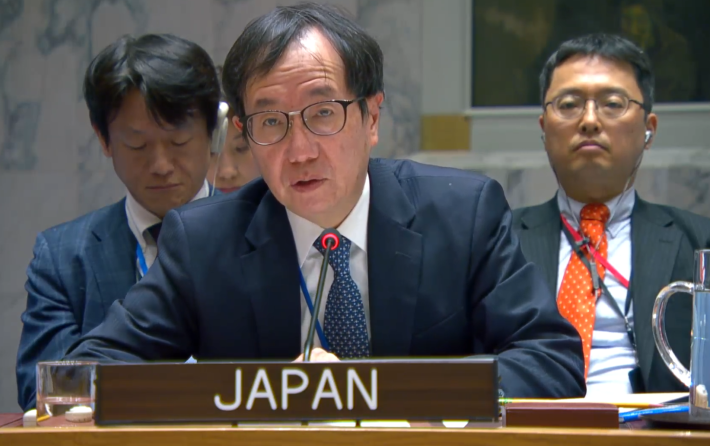児童と武力紛争に関する安保理ブリーフィングにおける山﨑大使ステートメント
令和6年4月3日

(As delivered)
I thank Ms. Gamba, Mr. Chaiban, and Ms. Niger-Thomas for their informative and insightful briefings.
I would also like to thank Malta for convening this very important and timely briefing, and again we would like to express our congratulations of your assumption of your presidency.
First of all, Japan expresses its deepest concern over the fact that harm is cause to civilians, including aid workers who are working tirelessly to deliver essential humanitarian supplies to the people of Gaza and elsewhere. Japan extends sincere sympathy to victims and offer its condolences, and also expresses its heartfelt sympathy to those injured. This tragedy should not happen, and Japan strongly calls for the staunch respect to the international humanitarian law on the ground.
Madam President,
The denial of humanitarian access has serious impacts on children. It is alarming that there has been a sharp increase in reports of such denials since 2019.
Japan is concerned about the consequences of denials, which include disruption of education, recruitment and use of children, suffering under malnutrition, and mental health issues.
It is particularly striking that one in every five children now lives in armed conflict, facing heightened risk of death not directly from attacks but also from disease and hunger. The leading factor contributing to this grave situation is the denial of humanitarian access.
The denial of humanitarian access creates human security crises, threatening the dignity of all, especially children. We must act decisively and consistently to improve the situation of children in armed conflict. In this regard, let me stress three areas in which the international community should take action immediately.
First, it is imperative to remove impediments to humanitarian operations. Ensuring safety, such as through the removal of explosive weapons, including landmines, is a pre-requisite for delivering humanitarian assistance. Allowing smooth administrative procedures, such as prompt visa approvals and custom clearances, must not be overlooked, either.
Second, the international community should expand its efforts to support children’s right to education and their development under armed conflict. Every single day counts when it comes to children’s education and development. We should spare no effort in ensuring access to safe and quality education for children, particularly for girls who are disproportionately affected by interruptions to education and therefore become vulnerable to other grave violations, such as sexual violence.
In situations where continual formal education is difficult, Japan values UNICEF and other humanitarian partners that provide recreational activities, which can at least serve as a safe space for children. In alignment with these efforts, in 2023, Japan provided over 100 million USD to UNICEF to protect children’s wellbeing in Syria, Haiti, Mali, Afghanistan, Ukraine, Ethiopia, and Myanmar. Japan also recently announced a 12 million USD grant to UNICEF to support children in the Middle East and North Africa who are affected by humanitarian crises, including conflict.
Finally, we must all unite under the rule of law, and all parties to conflict must comply with international law, including international humanitarian law. Save the Children describes the increase in violations relating to children as a “crisis of compliance.” This highlights that the issue is not the lack of legal instruments to protect children. Instead, it underscores an increasing trend of disregarding international humanitarian law.
Strengthening the rule of law requires building strong governance and legal institutions. Japan is a proud supporter of national efforts to build legal institutions and develop human resources around the world. We will continue to work together with other States to make every possible effort to protect children.
Madam President,
We are responsible for addressing human security threats and removing any impediments hindering children’s ability to pave their future. Let us once again put forward our best efforts to make sure all sufficient humanitarian aid is delivered to children in crises because they deserve to live in dignity.
I thank you.
